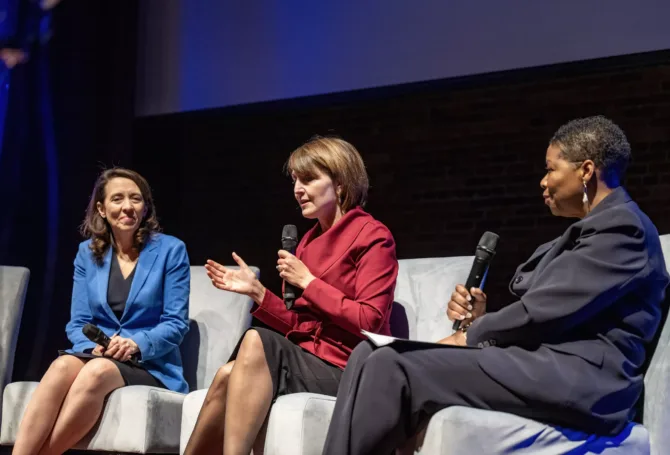
Progress on voting rights, infrastructure investment and family support legislation has ground to a halt in the Senate. Even a proposed bipartisan commission to study the January 6 Capitol insurrection failed to get enough support. The inaction has fueled renewed concern about congressional gridlock and how to unstick it.
With 50 Democrats and 50 Republicans, Senate gridlock was predictable. The 60-vote rule to end a filibuster made gridlock even more likely. While Democrats are nominally in control because Vice President Kamala Harris can break a tie vote, they are largely stymied in moving the Biden administration agenda or, in the case of the January 6 commission, anything former President Trump opposes.
As a consequence, Biden’s American Jobs Plan, American Families Plan and tax measures to pay for the plans are high-centered in the Senate. The For the People Act, which passed the House with bipartisan support, is also stuck in Senate procedural mud. Democratic Senate Majority Leader Chuck Schumer decides what bills come to the Senate floor. GOP Senate Minority Leader Mitch McConnell decides whether bills make it to the Senate floor.
Structural gridlock is exacerbated by the insistence of West Virginia Democratic Senator Joe Manchin that infrastructure investment and voting rights legislation must pass with bipartisan support. Negotiations between the Biden White House and Senate Republicans on infrastructure investment have produced some movement on both sides, but no final agreement. Manchin believes a deal is still possible and necessary. He and Republican Senators Mitt Romney of Utah have engaged in their own negotiations, but also failed to land on a bipartisan compromise. The Problem Solvers Caucus is also still engaged on reaching a bipartisan deal. The House Transportation and Infrastructure Committee, chaired by Oregon Congressman Peter DeFazio, began marking up an infrastructure package today.
Manchin wrote an op-ed announcing to the world and his Senate colleagues that he opposed the For the People Act, a Democratically backed voting rights measure that he labeled as partisan. Instead, Manchin said he supports the John Lewis Voting Rights Advancement Act, named after the late Congressman John Lewis and, according to the senator, more apt to win bipartisan support in the Senate. So far, only one Republican senator has expressed support for John Lewis Act.
Manchin openly pleaded with Senate Republicans to support the bill to create an independent, bipartisan commission to study the January 6 Capitol insurrection. Six Republicans voted in favor of the motion to bring the bill to the Senate floor. To make it to the floor, however, 10 Republican votes were needed.
The current gridlock doesn’t show signs of being temporary. McConnell has implied as much, saying his job as minority leader is to block major Biden initiatives. McConnell made good on a similar pledge during the tenure of President Barack Obama. There is a clear political motive: Denying Biden legislative victories increases the odds Republicans can retake control of the House and Senate in the 2022 midterm elections, which will be aided by newly redistricted congressional boundaries drawn by GOP-led state legislatures.
The political standoff has convinced many people on both sides of the political spectrum that our government is broken. The standoff also has sparked a wide range of ideas for how to end – or at least work around – the gridlock. Ideas range from ditching or modifying the Senate filibuster, relying on national ballot initiatives and allowing secret Senate votes. Other suggestions include tying controversial bills to pork barrel funding and awarding congressional bonuses based on merit.
The easiest workaround is budget reconciliation, the no-filibuster procedure that allows the Senate to pass budget-related omnibus legislation with a simple majority vote. That’s how the American Rescue Plan was approved in the early days of the Biden presidency. That’s almost how the Affordable Care Act was repealed in the Senate, which failed when the late Senator John McCain dramatically entered the Senate chamber and voted thumbs down.
Calls have grown louder to scrap the filibuster altogether or modify it by requiring senators to speak in-person for hours on end instead of just filing a written notice.
Previous Senate leaders have eliminated filibusters from judicial confirmations. McConnell extended the elimination to Supreme Court justices. The 60-vote cloture rule to end filibusters could be modified to require only 55 votes and apply to limited types of legislation, such as voting rights. It’s not clear whether even a 55-vote cloture requirement would enable the For the People Act to reach the Senate floor. If such a reduced cloture vote pertained more broadly, the January 6 commission measure may have gone to the Senate floor and passed.
Biden, who served in the Senate for 36 years and presided over it as vice president for eight more years, hasn’t embraced major change to the filibuster. Instead, he has voiced support for bipartisan compromise, which has led to the as-yet unfruitful negotiations over his infrastructure investment proposal. Meanwhile, pressure is growing among congressional Democrats to move forward with or without GOP support. They worry congressional inaction will weaken their chances to retain or strengthen control in the 2022 election.
Senate Democrats only get one more crack this year at budget reconciliation, according to a ruling by the Senate Parliamentarian. That could mean jamming together infrastructure, family support, health care expansion and various spending bills into one gigantic reconciliation package.
Failure to find bipartisan common ground will force Biden’s hand. Instead of trying to persuade Senate Republicans, he may be forced to find a way to persuade Manchin that bipartisan agreement is good in theory, but elusive in practice. Biden’s persuasion may need to extend beyond infrastructure. Manchin is the only Senate Democrat who isn’t a cosponsor of the For the People Act.
Pressure is growing among congressional Democrats to move forward with or without GOP support. They worry congressional inaction will weaken their chances to retain or strengthen control in the 2022 election.
So far, Biden hasn’t displayed impatience, but on Tuesday he signaled a change in strategy when he ended negotiations with West Virginia’s other senator, Republican Shelley Moore Capito. He appeared to turn to a different configuration of senators – Manchin, Kyrsten Sinema, D-Arizona and Bill Cassidy, R-Louisiana. Meanwhile, Senate Majority Leader Chuck Schumer indicated he will pursue a two-track strategy – a bipartisan deal and a budget reconciliation path.
The Senate this week managed to muster a bipartisan majority to approve the $250 billion Innovation and Competition Act, which was propelled by fears China is eclipsing the United States in technology. The measure allocates $50 billion to boost domestic production of advanced semiconductors used in cars, cell phones and military hardware. The bill also contains authority for sanctions on China for human rights abuses, funding for a study to determine the origins of the COVID-19 virus and a call for a diplomatic boycott of the 2022 Winter Olympics in China. Another $10 billion will go to create new regional technology hubs throughout the country. The legislation passed on a 68-32 vote and now goes to the House. The floor vote was delayed because some Republicans objected to how amendments were processed.




